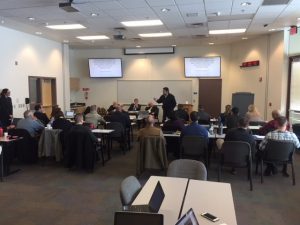By Troy Brunson and Sherrod Smith
The immeasurable trauma inflicted by a hate crime transcends any single victim and her friends and family. Hate crimes target entire communities and tear at the social fabric of our society. If not dealt with adequately and fairly, a hate crime can isolate communities, sow distrust amongst residents and neighbors, and foster animosity and fear of the public institutions that are charged with upholding public safety. Community leaders can help offset these deleterious consequences by ensuring fair and transparent hate crime investigations and prosecutions.
This is why from February 28 – June 1, the Stop Hate Project teamed with the Navajo Nation Human Rights Commission the Flagstaff Police Department, the Matthew Shepard Foundation and Civil Rights Enforcement Associates (CREA) to host a two-day hate crimes investigation and prosecution training in Flagstaff, AZ.
 Training attendees included law enforcement officers, investigators, and local prosecutors from Flagstaff, AZ, as well as five other jurisdictions in Arizona. Throughout the training, participants had the opportunity to learn and interact with one another under guidance of three former prosecutors with a combined 100 plus years of experience prosecuting hate crimes in the Department of Justice Civil Rights Division, Stop Hate Project leadership, and the former Federal Bureau of Investigation (FBI) Civil Rights Unit Chief.
Training attendees included law enforcement officers, investigators, and local prosecutors from Flagstaff, AZ, as well as five other jurisdictions in Arizona. Throughout the training, participants had the opportunity to learn and interact with one another under guidance of three former prosecutors with a combined 100 plus years of experience prosecuting hate crimes in the Department of Justice Civil Rights Division, Stop Hate Project leadership, and the former Federal Bureau of Investigation (FBI) Civil Rights Unit Chief.
Attendees learned insightful details on important federal hate crime statutes, including the Fair Housing Act of 1968 and the Shepard-Byrd Hate Crimes Prevention Act of 2009, as well as the two state hate crime statutes that deal directly with hate crimes in Arizona. After studying the federal and state hate crime statutes, participants were divided into breakout groups to work through tailored simulation exercises that promoted communication and a team oriented approach amongst group members. During the simulations, participants were asked to: suggest investigative strategies for developing evidence of identity and motive, identify appropriate approaches for key witness interviews, conduct mock interviews with a key witness, consider whether a case study contains evidence of a hate crime as defined by state or federal hate crime statutes, and examine best practices for building trust and legitimacy in the community. After each exercise, every groups’ techniques and strategies  were critically evaluated by the trainers and other teams.
were critically evaluated by the trainers and other teams.
Attendees also had the chance to hear input directly from the community through Navajo Nation Supreme Court Justice Eleanor Shirley and Promise Arizona Executive Director Petra Falcon. Both Justice Shirley and Ms. Falcon shared perspective on the pain that hate crimes have caused in the communities they represent and the significance of justice and accountability in responding to a hate crime. Additionally, Justice Shirley and Ms. Falcon reinforced the notion that public safety officials must be intimately connected to the needs and issues affecting their community in order to respond effectively to hate crimes. This involves trainings as well as regular participation in community forums and other public engagements.
The Stop Hate Project is proud to have partnered with the Navajo Nation Human Rights Commission, Civil Rights Enforcement Associates, the Flagstaff Police Department, and the Matthew Shepard Foundation to host this training. The comprehensive training curriculum and the opportunity to critically assess the needs of law enforcement officers, prosecutors, and the community for a successful hate crime investigation and prosecution certainly helped the law enforcement professionals in attendance. Their new knowledge will help communities cope with the trauma of a hate crime.
In listening to the communities we work with and analyzing available data, it is clear that similar trainings are needed to ensure that police and prosecutors across country have the tools necessary to work with their respective communities to adequately respond to hate crimes. Accordingly, the Stop Hate Project looks forward to collaborating with our partner organizations to replicate these training opportunities in jurisdictions around the country.
Troy Brunson is an intern with the Stop Hate Project. Sherrod Smith is Project Coordinator for the Stop Hate Project.


